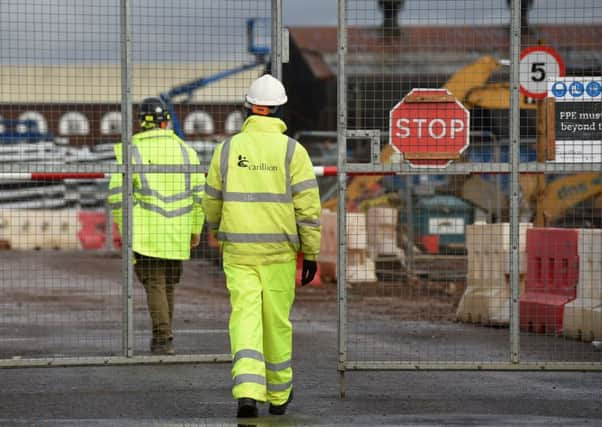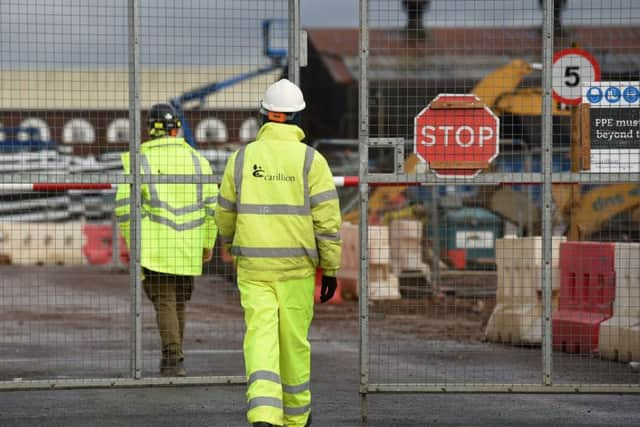Darren McGarvey: Carillion - giants of capitalism or scroungers?


Yesterday morning, thousands of employees awoke to hear the news that their employer, Carillion, the UK’s second largest construction company, was going into liquidation. Finally overwhelmed by its financial problems – namely a catastrophic debt burden – the firm, which employs nearly 20,000 people in the UK, threw in the towel after talks with creditors and government failed.
Carillion, in just seven years, has seen its debt balloon to around £1.5bn, compounded by a pension liability of between £600m and £800m. To put this in some context, Carillion is now valued at just £61m.
Advertisement
Hide AdAdvertisement
Hide AdThe company went into liquidation because trust in its ability to manage its financial affairs collapsed. But where a lot of big business is concerned, especially when it overlaps with public services and infrastructure, public trust plummeted a very long time ago, with good reason.


Let’s lend some further context to why people are furious about this. This morning I, like thousands of people across the UK, received a random, strongly worded letter from the Department of Work and Pensions, informing me that I owe them £85 of overpaid benefit from nearly ten years ago.
One may speculate as to why the government is so keen to deploy such vast resources and expertise in recouping paltry sums of money like this. Or why it’s so effective at clawing back cash from certain sections of the population but less keen to balance the books when it comes to others. Maybe it has something to do with the fact some, by virtue of social inequality, don’t possess the means, time or know-how to reliably contest such things?


Meanwhile, over at Carillion, former execs are probably already receiving the best public relations, legal and financial advice on how best to manoeuvre their way out of further scrutiny – with pockets full of cash. The implications of Carillion’s liquidation are massive, not only for the thousands of employees, who now face immediate and long-term job uncertainty, but also for the various public projects and services Carillion is currently building, like the Aberdeen by-pass, or managing, which covers everything from the digital surveillance agency to 32,000 school dinners across the UK. Then there’s the staff at thousands of sub-contractors, which supplied Carillion with goods and services, now owed millions and still waiting to be paid. The knock-on effect of the engineer’s collapse may affect everything from rail services to the running of prisons as well as the Ministry of Defence.
Carillion has been woven into the fabric of Britain’s infrastructure over the last two decades and its sudden failure will reverberate chaotically across public life for many years to come.
Given the sheer scope of the impact across the UK, surely we can be confident that those responsible for this monumental cock-up, caused mainly by risky investments and corporate over-reach (couched in the aftermath of a financial crash that was caused by the same sort of corporate behaviour) will face consequences like everyone else affected?
I guess it’s a shame that the chair of Carillion, Philip Green (not that one), was binned by Number Ten in 2016, where he’d been, ostensibly, providing advice on the important matter of corporate responsibility.
Maybe he’ll have some insight into why some executives, just months before the firm became embroiled in the accounting crisis, introduced tougher rules to protect bonuses paid to bosses. Maybe he’ll be able to explain how the good folks in charge of an ailing company were able to change the wording of its pay policy to make it harder for investors to recoup their generous payouts. After all, it certainly appears that former board members (removed in September last year when the true extent of the crisis became apparent) have managed to make millions while overseeing what can only be described as abject corporate failure.
Advertisement
Hide AdAdvertisement
Hide AdMuch of the debt will likely be absorbed by subcontractors, many of which may have to lay off staff or even face bankruptcy. Smaller firms could see their owners robbed of their capital which, thanks to the wonders of trickle-down economics, may lead to people not only losing their jobs or their businesses, but also assets – like their homes.
Then we have the immediate impact on the 19,500 employees themselves, who must be going out of their minds with worry, not knowing what the future may hold from one day to the next.
Many commentators will react with scorn at the notion that businesses of this nature should be taken into public ownership, but the sheer frequency at which taxpayers are footing the bill for this kind of corporate mismanagement is nothing short of appalling. Who the hell do these people think they are?
If big companies need public money, then it’s reasonable that the shareholders concede part or complete ownership to the people stumping up the cash. Otherwise, what are we doing but greenlighting a corporate welfare system designed to insulate wealthy executives from what may be the consequences of their own greed and incompetence?
Are we so servile and stupid that we’re willing to be fooled by the daft idea that the integrity of our economy will be dangerously compromised by simply applying the same rules to them that we are subject to ourselves? Do they ever receive strongly worded, threatening letters from a government department? Is it not this reckless tier of rotating cronies, incentivised by loopholes and granted legal safe-haven by opaque, dissociative corporate jargon, that have proven themselves, time and time again, to be the biggest threat to our economic stability?
If capitalism is all about creating incentives, what incentive currently exists to discourage economic vandalism on this sort of vulgar, absurd scale? Quick answer: none. At least for now. What a bunch of shameless, hypocritical, parasitic scroungers.
